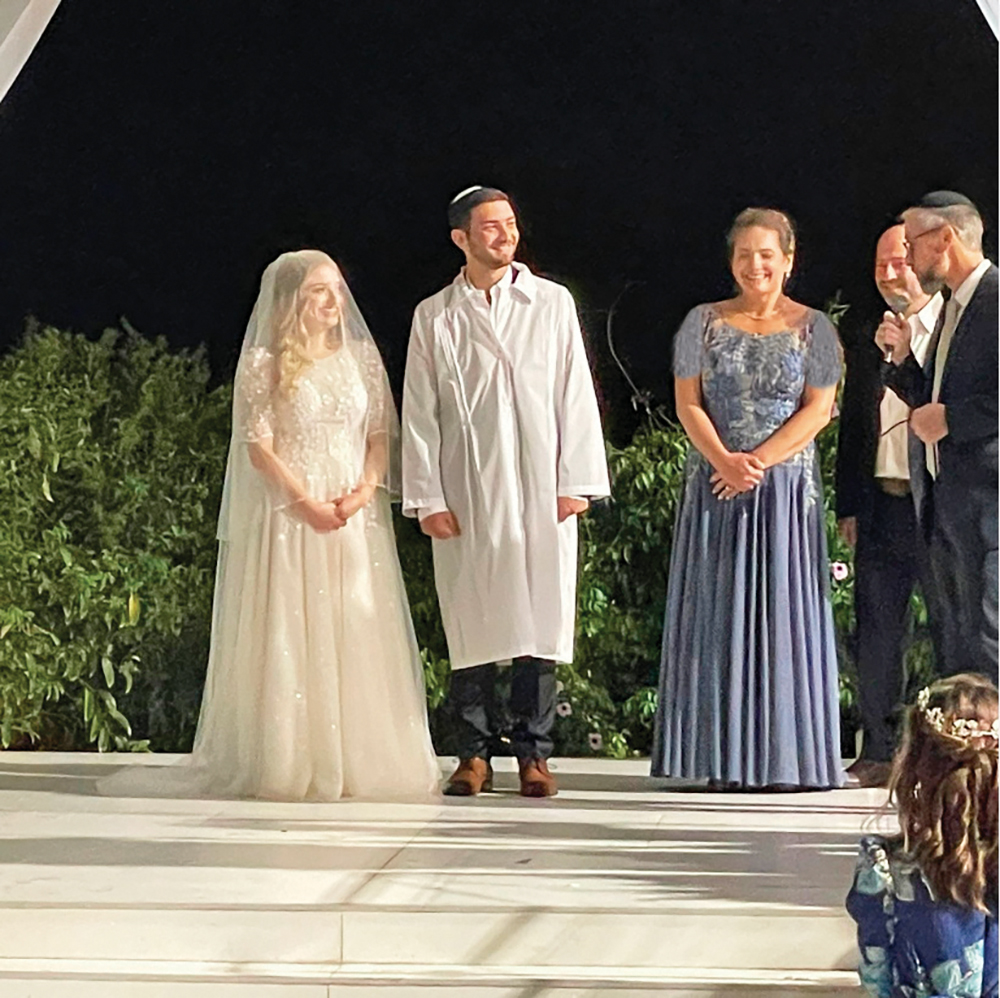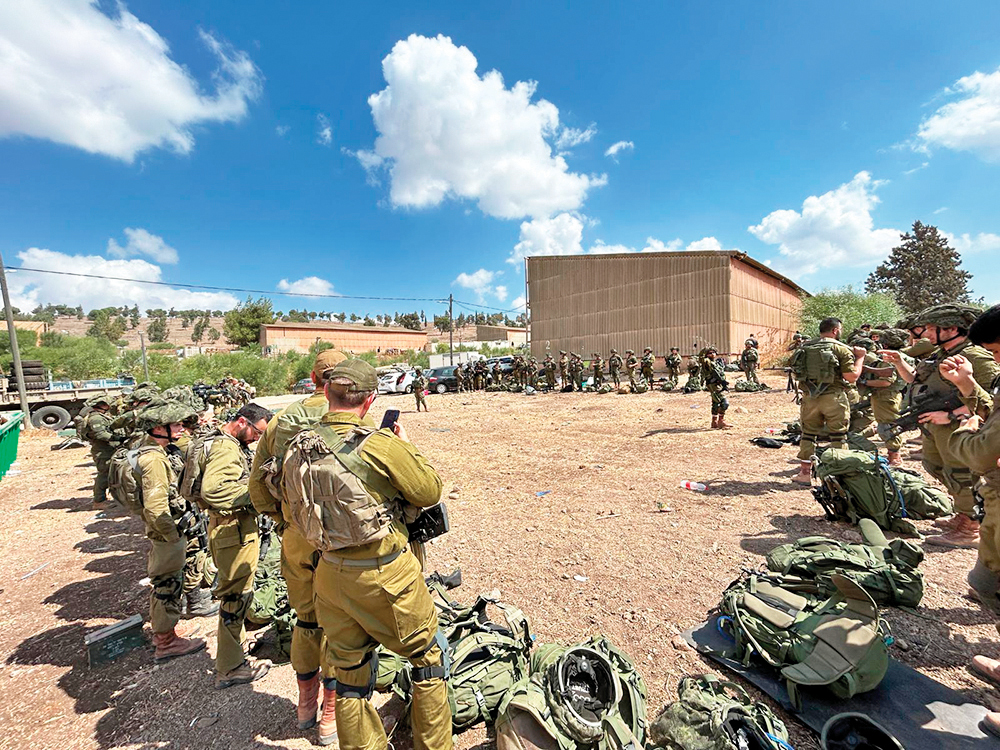
When I was unexpectedly called back for a third round of miluim just 47 days before my wedding, I could hardly believe it. While traveling up to base, I joked with a friend that at the very least, I better get a good Jewish Link article out of this. Over the past year, miluim had already interfered with my personal life and the lives of all families involved, but this time felt particularly daunting. I was juggling wedding preparations, moving into and furnishing a new apartment, and preparing to start university. The uncertainty of when my unit would allow me to see my fiancé, Meira, also added to the stress. I couldn’t provide her with a timeline or any assurances about flexibility, as I was initially told I would only be guaranteed to leave for the wedding day itself—and anything beyond that, required approval from higher-ups who weren’t ready to make any promises.
As the days counted down to our wedding, my unit entered Lebanon right before Rosh Hashanah. Thank God, the mission was successful, and we exited five weeks before the wedding. I was briefly released for a couple of days, and—after persistent pleading—I managed to get myself a few more. During this time, I frantically tried to move into our new apartment, however, coordinating the other tasks related to it was nearly impossible with my unpredictable schedule and the chagim. For the next few weeks, I repeatedly tried to reason with my commanders. I explained that the stress of entering Lebanon while also trying to prepare both logistically and mentally for my marriage with complete uncertainty was too overwhelming. I argued that I needed a few weeks to settle into my new life and orient myself, so I could return to service in a healthier headspace. Unfortunately, their response was always the same: “We know it’s hard, but we can’t let anyone leave right now. Let us know how else we can help.”
Meira and I continued to seek empathy from the unit rabbi, the administration office and the mental health officer. While they all expressed understanding, they all echoed the sentiment that we must prioritize our duty to Am Yisrael—which, of course, is the number one priority—but we felt that they didn’t address the root of our struggle. To make matters more frustrating, I wasn’t even being sent on missions at that point, they just wanted me to be on base. Friends outside the army told me that they’d never heard of a miluim unit being so inflexible with a reserve soldier, especially one about to get married. Thank God, though, Meira and I had incredible support from our friends and family the whole time. Their encouragement reminded us that Hashem has a plan and would guide us through this challenging time. Ultimately, about a week and a half before the wedding, my unit said I could leave one week before and after the wedding. Just two days later, we were all released indefinitely, and all of my friends were able to attend.

Throughout those 47 days, I had a constant internal debate in my head—on whether I was justified in asking to leave the army during an important national operation for a deeply personal milestone. On the wedding day, however, it became clear that everything we had endured was not only part of Hashem’s greater plan, but also an expression of His boundless love for us—guiding and strengthening us through the challenges. We chose to hold our chuppah outdoors, with a breathtaking view of the hills of Yerushalayim. Although it was the start of the rainy season, we took the chance, hoping Hashem would bless us with a dry ceremony—especially after the grueling process we had endured leading up to the moment. Of course—with our luck—at around 3 p.m., it started to drizzle which soon escalated into the first heavy downpour of the season in that area. As we prepared for the kabbalat panim, we discussed backup options, including holding the chuppah in the lobby under a makeshift canopy of four poles and a tallit. What was obvious though, was that—at the end of the day—if we left married, we were happy.
Baruch Hashem, the rain actually stopped with enough time to dry up the area. The post rain atmosphere even added a warm feel to the outdoor setting of the chuppah. As the song, “Mayim Rabim” played, I couldn’t help but reflect on the powerful connection between its words and our experience: “Many waters cannot quench love, nor can rivers flood it,” (Shir HaShirim 8:7). The rain felt like a symbol of the challenges we had faced, which through the rain literally persisted up to the chuppah itself. Yet, just as the love between a bride and groom is unshakable—so much so that the wedding would still take place despite any amount of rain—so too, is the eternal bond between Am Yisrael and Hashem. This is the very essence of Shir HaShirim’s imagery. Rashi interprets “many waters,” as referring to the nations of the world and “rivers” as their kings and princes. Despite their attempts to drown out the love between Hashem and the Jewish people through force and terror—just like right now—they cannot extinguish it. But we remain constantly strong in our faith that the ultimate expression of Hashem’s love will come on our “wedding day” with Him, in the building of the Beit Hamikdash.
Recent events, however, have tested that faith. The war continues in Israel, and carefully schemed antisemitic attacks have surged globally—from the pogrom in Amsterdam to the horrific murder of Rabbi Zvi Kogan, HY”D, to soldiers visiting Cyprus having an arrest warrant put out for them and pro-Hamas riots and threats against Jews even in our own backyards. The fact of the matter is that the enemy has seen that they cannot successfully attack Israel inside its borders, so they were forced to spread outside of them at a significantly increasing pace.
The increasing antisemitic attacks abroad serve as a painful reminder of the challenges our people face when in exile. Yet, these hardships can be seen as part of Hashem’s attempt to guide us back to Him, much like the chastisement lamented by the 10 exiled tribes in sefer Yirmiyahu: “You have chastised me, and I was chastised (יִסַּרְתַּנִי וָאִוָּסֵר) as an untrained calf, O lead me back, and I will return … ” The phrase יִסַּרְתַּנִי וָאִוָּסֵר can be linked to the word, “yissurim” (hardships), suggesting that Hashem allowed the northern tribes to experience difficulties at the hands of other nations.
However, this same phrase can also be connected to the word, “mussar” (moral guidance), implying that these hardships had an underlying purpose—to give us direction and encourage our spiritual growth. Unfortunately, like an untrained calf that resists correction, and goes back to its erred ways over and over again, the northern tribes initially ignored these lessons. Only later did they come to realize that these challenges were intended to guide them back to the right path.
Rabbeinu Yona—in Shaarei Teshuva—compares this process to someone immersing in a mikvah while still holding onto an impure object. To achieve purity, one must first let go of what makes them impure. Similarly, when we strive to genuinely return to the land of Israel while simultaneously clinging to the dream of investing in and strengthening the foreign lands we currently inhabit, it mirrors what Shaarei Teshuva describes as, “one who holds a sheretz (impure creature) while attempting to purify themselves in a mikvah.” Only by releasing the sheretz can true purification occur. We can not truly be involved in the Jewish future in Israel from the outside. Only once we let go of the impurities of the Diaspora, can Hashem fulfill His promise: “I will take you from among the nations and gather you from all the countries, and I will bring you to your land. I will sprinkle clean water upon you, and you will be clean; I will cleanse you from all your impurities and all your abominations,”
(Yechezkel 36:24-25).
The story of Elazar ben Durdaya further reflects this idea. After a lifetime of sin, he realized his mistakes and sought the mountains, heavens and stars to pray for teshuva on his behalf. They all told him that they can’t, that they must pray on behalf of themselves first. Realizing that teshuva depended solely on his own actions, he declared the famous words, “Clearly, the matter depends on nothing other than myself.” He placed his head between his knees and cried loudly, until his soul left his body. A divine voice emerged and said: “Rabbi Elazar ben Durdayya is destined for life in the world-to-come,” (Avodah Zara 17a). Rav Aharon Levine teaches that all the beings Elazar ben Durdayya asked from to daven on his behalf represent the external influences around us in life, and use to blame for our struggles. Many times, we expect our upbringing, community, politics or career to take the first step before we can act ourselves. However—as Elazar ben Durdaya learned—the journey toward any teshuva must begin from within the individual. We can then see how all those outside influences are all sent by Hashem to help us along that journey of return.
We can look at the many positive, miraculous developments in Israel over the past year. Couples are still getting married, babies are being born and Torah continues to flourish. Hamas and Hezbollah have been significantly weakened, while Israel continues to grow with new cities, buildings and public services being developed every day.
At the same time, the challenges facing Jews in the Diaspora highlight the dangers of being defenseless in Chutz La’Aretz. Small victories for the Jews, like a favorable election result or support from a politician, or even the ability to peacefully disregard the issue might provide temporary relief, but, ultimately, passes the problem on to the next generation. When we align ourselves with the Torah’s vision and face the realities before us—no matter which side of the coin we look at—we uncover Hashem’s boundless love for us both as individuals and as a nation. It is this love that calls us to take the first step toward our homeland and embrace the path of faith, resilience and unity that will, ultimately, lead us to our redemption.
Brian Racer is originally from Teaneck. He served as a lone soldier in the Nachal Brigade and learned at Yeshivat Lev HaTorah in Ramat Beit Shemesh. He is currently studying Communications and Political Science at Bar Ilan. He can be reached at Brian.Racer@yahoo.com.









